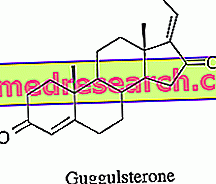What's this
The swollen belly sensation is a widespread gastrointestinal symptom; it is estimated that about one person in ten has suffered, suffers or will suffer in the course of life.

Note : the terms meteorism and tension or abdominal distension are often used as synonyms of abdominal swelling, sometimes improperly.
The swollen belly can be associated with flatulence, abdominal pains or cramps, diarrhea and constipation, while the uncomfortable condition most frequently associated with abdominal bloating is irritable bowel syndrome.
The swollen belly is perceived as an unpleasant sensation of swelling of the abdomen, just as if the internal cavity had been inflated similarly to a "balloon". The anatomical regions involved are: epigastric, umbilical, hypogastric and often the right and left hypochondrium.
The sensation of swelling is activated when certain volumes inside the abdomen, in particular those enclosed in the digestive tract - stomach and intestine increase "forcibly" beyond normal. Other factors may be involved such as for example the menstrual cycle, hepatic steatosis, calculosis or biliary lithiasis and certain bladder pathologies; however, these are generally easy to differentiate conditions that rarely complicate the specific diagnosis.
Statistically speaking, most cases of abdominal bloating are due to benign, paraphysiological or otherwise idiopathic conditions, in the absence of any diagnosable disease or pathogenic condition. Moreover, this perception is triggered in an extremely subjective way. Individuality is a very difficult variable to manage, especially with regards to diagnosis. In fact, cases of strong autosuggestion are not rare - typical for example of hypochondria. On the opposite side, we must not even confuse a poor specific tolerance with possible abdominal swelling of psychosomatic origin, to which corresponds, for emotional or behavioral issues - hyper-production of catecholamines, aerophagia, etc. - a real but often transient abdominal distension.
deepening
Abdominal distension, which many call the sensation of abdominal tension, is actually a definite clinical sign. It is also possible to correlate very different situations with the sensation of swelling or the actual presence of gas in the digestive tract, such as the accumulation of intraperitoneal fluid called ascites - a clinical sign indicating very serious upper pathologies.
To learn more: Meteorism: What it is and Possible Causes »Causes
What inflates your belly?
As anticipated, the sensation of swelling is activated more often when the volumes of the stomach and intestine increase "forcibly", beyond normality. These spaces can be filled with liquids, solids or, more frequently, gas.
Ultimately, you may have a swollen stomach after eating or drinking too much, if you suffer from stomach acid or diarrhea, if too much air is swallowed or if too many intestinal gases are produced - either by "good" bacteria (flora physiological intestinal) and those "bad" - pathogens.
When one has the perception that to occupy the gastric and / or intestinal volume is only gas, the sensation of a swollen belly correlates to meteorism; however, even in this case, it is not appropriate to talk about abdominal distension until the doctor objectively detects an internal expansion of the cavity.
Main cause of abdominal bloating: gases
Let's start by saying that the production and retention of gas can be higher in people who do not feel any discomfort compared to subjects who, although they contain less, complain of having a swollen belly.
Normally in the intestine 100-150 ml of gas are stationed, with subjective variations from 30 to 200 ml. Among them stand out: nitrogen, oxygen, hydrogen, carbon monoxide and methane. This volume is subject to physiological regulation, which essentially takes place through 2 processes:
- Intestinal absorption and pulmonary expulsion (perfusion and ventilation)
- Belching and flatulence - the first occurs when the gases are atmospheric and are introduced with swallowing, the second when they are the result of bacterial metabolism in the intestine.
It is believed that belching and flatulence take on greater importance when the volume of gas becomes "excessive", even though we have already pointed out that there is no real normality threshold. What is undeniable, however, is that they are still of fundamental importance. Sometimes it is precisely the voluntary or involuntary absence of belching and flatulence that feeds the abdominal swelling; glottis and anus must assume the role of "emergency valve". These practices, from the most considered not very compliant with the bon ton, are instead the key to solve most cases of swollen belly. The stimulation of swelling must achieve liberation, which can easily be carried out in the toilet.
So far we have talked about conditions in which the concentration of gas is more or less normal; we now enter into the merits of the actual excess, dividing the causes according to the etiology.
Anxiety
Anxiety: main cause of a swollen belly
Anxiety is a major cause of abdominal bloating; let's see why.
The intestine is considered a sort of "second brain", not because it is able to reason, but because it possesses most of the same nerve and endocrine receptors. It is therefore inevitable that it reacts to the same stimuli. The way of saying "get scared" is therefore far from unfounded.
Emotional states affect the balance of neurotransmitters; in particular, fear, anxiety and negative stress can increase the density of catecholamines and cortisol released by the adrenal gland. These interact with the intestine altering its functionality; for example, increasing peristaltic contractions, increasing mucus production, etc.
In these cases, the solution is certainly to solve the responsible emotional states - many find it useful to take anxiolytic drugs or other therapies with the same purpose.
aerophagia
Aerophagy: swelling the belly by swallowing air
Aerofagia is the aptitude to swallow excess air. This can happen during meals, especially eaten frugally, chewing a little, talking, smoking, drinking quickly, or chewing gum. Aerofagia can be a consequence of anxiety.
diseases
Pathological causes of the swollen belly
Irritable bowel syndrome
Statistically speaking, first of all is irritable bowel syndrome. Many do not consider it a real disease, but an uncomfortable condition that involves a series of particular symptoms.
Bacterial contamination syndrome of the small intestine
The physiological intestinal bacterial flora should predominantly colonize the large intestine, not the small intestine tract.
Indeed, it has recently been discovered that there are other types of physiological bacteria, other than lactobacilli and bifidobacteria. These, remaining hidden in the mucosa, are difficult to detect with a simple sampling of the feces. It is therefore still little known microorganisms, but it is not excluded that they can colonize even higher tracts than the colon.
However, when the fermentable flora populates the small intestine, the metabolic activity increases with it. The gases are among the waste of their food. For this reason, the syndrome of bacterial contamination of the small intestine has as a primary symptom the abdominal swelling, associated with disorders of the intestine - diarrhea alternating with constipation - and often with specific cramps and pains.
This migration can take place for various reasons; a very widespread is the excess of prebiotic molecules, in particular of soluble carbohydrates. Not by chance, often the solution is a simple dietary rebalancing; in some cases, on the other hand, it may be useful to follow a very short period (a few days) of a low carb diet with a low residue - that is, low in fiber, especially insoluble. But let's not forget that the lack of fiber and the lack of carbohydrates, to the advantage of proteins and fats, can also be a cause of intestinal discomfort and therefore of a swollen belly.
The diagnosis of this syndrome can be made through a simple "breath test", which can identify any bacterial rise in the small intestine.
Chronic inflammatory diseases
Chronic inflammatory diseases, such as ulcerative colitis and Crohn's disease, can manifest a symptomatic pattern that includes a swollen belly. Obviously these are decidedly more problematic conditions in which the swelling is the least of the problems.
Infections, infestations and intoxications
Infections, infestations and poisoning can cause abdominal bloating. A classic example is viral gastroenteritis; the common "flu with vomiting and diarrhea". It can also occur due to bacterial contamination or the production of their toxins, such as in food-borne diseases triggered by salmonella, cholera, coliforms, staphylococci, etc. Protozoan infestations, including amoebas, can also cause a swollen belly. Note : Typically, these clinical pictures also include diarrhea, cramps and other severe clinical symptoms and signs.
Reflex hypersensitivity or altered absorption
The swollen belly can be the secondary consequence of primary, intestinal but also liver diseases, which compromise the absorption of gases or their disposal.
Intestinal Bacterial Flora
Impairment of intestinal bacterial flora
It can occur due to diet-independent factors. The drastic reduction, for example, is often caused by the use of broad-spectrum antibiotic drugs. The cure consists in the use of specific drugs or supplements containing the bacterial strains in question, to be taken on an empty stomach for at least 2 weeks.
A similar but less severe picture can manifest itself due to dependent dietary factors - see below.
If the problem is the opposite, take into consideration what is recommended in the paragraph on the bacterial contamination syndrome of the small intestine.
Food intolerance
Food intolerances and abdominal bloating
Food intolerances are non-pathological causes of abdominal bloating diet-dependent. They do not concern healthy people and are therefore defined as "special conditions".
Only in really intolerant people - therefore diagnosable - can they cause a swollen belly: lactose intolerance, gluten intolerance or celiac disease - with the possibility of evolution in celiac disease - and histamine intolerance.
The therapy consists in the total exclusion of the responsible dietary factors.
Diet
Incorrect or unbalanced diet
Even in healthy people, an incorrect or unbalanced diet can be a reason for overproduction and intestinal gas retention. In truth, the causes can be different and do not necessarily have the same weight on all the subjects that suffer from swollen belly. Let's see some of them:
- Poorly digestible meals: due to absolute abundance, the poor digestibility of individual recipes, excess fiber, the presence of abundant fats and proteins, etc.
- Excessive or excessive reduction of intestinal bacterial flora: the reduction may be due to a diet poor in prebiotic factors (carbohydrates and fiber), as well as the excess from a diet characterized by the accumulation of nutrients in the colon - indigestible. This can be the consequence of: too abundant meals, rich in carbohydrates - especially lactose and fructose - or insoluble fibers, excessive amounts of fructose, abnormal concentrations of lactulose, but also sweeteners such as xylitol, mannitol and sorbitol, or raw starch or inverted etc.
- Abuse of carbonated beverages or foods that contain air - whipped cream, packaged ice cream etc.
- Introduction of irritating molecules to the intestine: coffee caffeine, black tea theophylline, chocolate theobromine, alcohol, energy drink, osmotic laxatives etc.
- Food intake rich in anti-nutrients such as: protease inhibitors, tannins, oxalates, phytates - contained in vegetables, for example in bran, in legume peel, etc.



